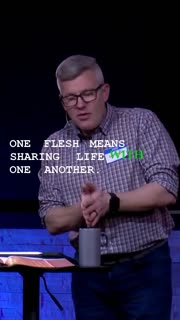Embracing Unity and Forgiveness in Marriage
Summary
### Summary
In our last session, we discussed the overarching goals of marriage: glorifying God, benefiting ourselves, and reflecting the gospel to others. Today, we delved into another crucial purpose of marriage: the concept of becoming "one flesh." This idea, often misunderstood as merely a euphemism for sex, is much deeper. It signifies a profound relational unity where husband and wife are no longer two individuals but one entity. This unity requires sharing life, growing in knowledge and love for each other, and understanding each other's desires, fears, and values.
We explored how this one-flesh union is established by God through the marriage covenant. Marriage is not just a personal commitment but a divine institution. When we make vows, we primarily make them before God, who joins us together. This divine joining warns us against allowing sin to separate what God has united. Sin, inherently selfish and prideful, acts as a wedge in marriage, leading to its death. The wages of sin is death, and this is true for marriages as well.
To combat the destructive power of sin, we must follow God's design for dealing with it: confession, repentance, and forgiveness. Confession involves admitting our wrongs without excuses. Repentance is a change of mind and heart that leads to a change in behavior. True repentance is marked by earnestness, eagerness, indignation, alarm, longing, concern, and readiness to change. Finally, forgiveness is an ongoing commitment, rooted in the forgiveness we have received from God. It involves not harming or shaming the other person, not dwelling on the offense, and continually placing the sin at the foot of the cross.
Forgiveness is essential for the survival and growth of any marriage. It is not just about letting go but about actively choosing to remember no more, just as God does with our sins. As we strive to grow in our one-flesh relationship, we must address the sin that separates us. This evening, some of you may need to have serious conversations, confess sins, and extend true forgiveness to each other. Let us lean on God's grace and the example of Jesus Christ to heal and strengthen our marriages.
### Key Takeaways
1. One Flesh Union: The concept of becoming "one flesh" in marriage goes beyond physical intimacy. It signifies a deep relational unity where husband and wife are no longer two individuals but one entity. This unity requires sharing life, growing in knowledge and love for each other, and understanding each other's desires, fears, and values. [01:51]
2. Divine Institution: Marriage is a divine institution established by God. When we make vows, we primarily make them before God, who joins us together. This divine joining warns us against allowing sin to separate what God has united. Sin acts as a wedge in marriage, leading to its death. [07:06]
3. The Destructive Power of Sin: Sin, inherently selfish and prideful, acts as a wedge in marriage, leading to its death. The wages of sin is death, and this is true for marriages as well. To combat the destructive power of sin, we must follow God's design for dealing with it: confession, repentance, and forgiveness. [09:09]
4. Confession and Repentance: Confession involves admitting our wrongs without excuses. Repentance is a change of mind and heart that leads to a change in behavior. True repentance is marked by earnestness, eagerness, indignation, alarm, longing, concern, and readiness to change. [14:54]
5. Forgiveness: Forgiveness is an ongoing commitment, rooted in the forgiveness we have received from God. It involves not harming or shaming the other person, not dwelling on the offense, and continually placing the sin at the foot of the cross. Forgiveness is essential for the survival and growth of any marriage. [28:00]
### YouTube Chapters
[0:00] - Welcome
[01:51] - Understanding One Flesh
[03:03] - No Longer Two, But One
[05:13] - Growing in Knowledge and Love
[06:13] - God's Role in Marriage
[07:06] - The Warning Against Separation
[08:05] - The Destructive Power of Sin
[09:09] - Sin Brings Death
[11:13] - Dealing with Sin in Marriage
[12:40] - The Closet and Backyard Metaphor
[14:54] - Responding to God's Grace in Confession
[16:59] - The Role of Conviction and Confrontation
[18:54] - Repentance: Changing Mind and Behavior
[20:38] - Godly Sorrow and Repentance
[22:37] - Earnestness and Eagerness
[24:26] - Fruits of Repentance
[26:26] - Evaluating Your Own Life
[28:00] - The Importance of Forgiveness
[29:54] - Rooted in God's Forgiveness
[31:31] - The Parable of the Unforgiving Servant
[33:19] - No One Will Sin Against You More
[35:33] - Definition of Forgiveness
[37:20] - Ongoing Commitment with God's Help
[38:46] - Not to Harm or Shame
[40:23] - The Story of the Brothers
[42:03] - Not Dwelling on the Offense
[43:52] - Choosing to Remember No More
[45:31] - Example and Forgiveness of Jesus
[47:13] - Addressing Sin and Unforgiveness
[49:13] - Closing Prayer and Fellowship
Study Guide
### Bible Reading
1. Matthew 19:5-6: "For this reason, a man will leave his father and mother and be united to his wife, and the two will become one flesh. So they are no longer two, but one flesh. Therefore what God has joined together, let no one separate."
2. James 1:15: "Then after desire has conceived, it gives birth to sin; and sin, when it is full-grown, gives birth to death."
3. 2 Corinthians 7:10-11: "Godly sorrow brings repentance that leads to salvation and leaves no regret, but worldly sorrow brings death. See what this godly sorrow has produced in you: what earnestness, what eagerness to clear yourselves, what indignation, what alarm, what longing, what concern, what readiness to see justice done."
### Observation Questions
1. According to Matthew 19:5-6, what does it mean for a husband and wife to become "one flesh"? How does this concept go beyond physical intimacy? [01:51]
2. What does James 1:15 say about the progression of sin and its ultimate consequence? How does this relate to the sermon’s discussion on the destructive power of sin in marriage? [09:09]
3. In 2 Corinthians 7:10-11, what are the characteristics of true repentance? How do these characteristics contrast with worldly sorrow? [20:38]
### Interpretation Questions
1. How does the concept of "one flesh" challenge the idea of individualism within marriage? What practical steps can couples take to grow in relational unity? [03:03]
2. The sermon mentions that sin acts as a wedge in marriage, leading to its death. How can couples identify and address sin before it causes significant damage? [08:05]
3. What role does godly sorrow play in the process of repentance, and how can it lead to genuine change in behavior and heart? [18:54]
4. How does the forgiveness we receive from God serve as a model and motivation for forgiving our spouse? What are the practical implications of this in daily married life? [28:00]
### Application Questions
1. Reflect on your own marriage or a close relationship. Are there areas where you have been living more like housemates rather than sharing life as "one flesh"? What changes can you make to grow in unity? [06:13]
2. Think about a recent conflict or hurt in your marriage. How did you handle it? Did you follow the steps of confession, repentance, and forgiveness? If not, what can you do differently next time? [11:13]
3. Identify a specific sin that has acted as a wedge in your marriage. How can you apply the principles of godly sorrow and repentance to address this sin? [20:38]
4. Have you ever struggled with truly forgiving your spouse? What steps can you take to ensure that your forgiveness is genuine and ongoing, as described in the sermon? [37:20]
5. The sermon suggests that some of you may need to have serious conversations, confess sins, and extend true forgiveness to each other. Is there a specific issue you need to address with your spouse tonight? How will you approach this conversation? [47:13]
6. How can you cultivate a heart of forgiveness that mirrors the forgiveness you have received from God? What practical steps can you take to ensure you are not holding onto grudges or bitterness? [29:54]
7. Reflect on the story of the brothers shared in the sermon. How can you ensure that when you bring up past issues, it is done in a loving and protective way rather than to harm or shame? [40:23]
Devotional
Day 1: The Profound Unity of One Flesh
The concept of becoming "one flesh" in marriage goes beyond physical intimacy. It signifies a deep relational unity where husband and wife are no longer two individuals but one entity. This unity requires sharing life, growing in knowledge and love for each other, and understanding each other's desires, fears, and values. This profound unity is a divine mystery that reflects the relationship between Christ and the Church. It calls for a commitment to mutual understanding and selfless love, where each partner seeks to know and support the other deeply.
[01:51]
Ephesians 5:31-32 (ESV): "Therefore a man shall leave his father and mother and hold fast to his wife, and the two shall become one flesh. This mystery is profound, and I am saying that it refers to Christ and the church."
Reflection: In what ways can you grow in understanding and supporting your spouse's desires, fears, and values today?
Day 2: Marriage as a Divine Institution
Marriage is a divine institution established by God. When we make vows, we primarily make them before God, who joins us together. This divine joining warns us against allowing sin to separate what God has united. Sin acts as a wedge in marriage, leading to its death. Recognizing marriage as a covenant before God elevates its significance and calls for a higher level of commitment and reverence. It reminds us that our relationship is not just about personal happiness but about fulfilling God's purpose and reflecting His love.
[07:06]
Malachi 2:14-15 (ESV): "But you say, 'Why does he not?' Because the Lord was witness between you and the wife of your youth, to whom you have been faithless, though she is your companion and your wife by covenant. Did he not make them one, with a portion of the Spirit in their union?"
Reflection: How can you honor the divine nature of your marriage covenant in your daily interactions with your spouse?
Day 3: The Destructive Power of Sin in Marriage
Sin, inherently selfish and prideful, acts as a wedge in marriage, leading to its death. The wages of sin is death, and this is true for marriages as well. To combat the destructive power of sin, we must follow God's design for dealing with it: confession, repentance, and forgiveness. Confession involves admitting our wrongs without excuses. Repentance is a change of mind and heart that leads to a change in behavior. True repentance is marked by earnestness, eagerness, indignation, alarm, longing, concern, and readiness to change.
[09:09]
James 5:16 (ESV): "Therefore, confess your sins to one another and pray for one another, that you may be healed. The prayer of a righteous person has great power as it is working."
Reflection: What sin or selfish behavior do you need to confess to your spouse today, and how can you take steps toward true repentance?
Day 4: The Role of Confession and Repentance
Confession involves admitting our wrongs without excuses. Repentance is a change of mind and heart that leads to a change in behavior. True repentance is marked by earnestness, eagerness, indignation, alarm, longing, concern, and readiness to change. This process is essential for healing and restoring relationships. It requires humility and a genuine desire to make amends. By embracing confession and repentance, we align ourselves with God's grace and open the door for His transformative work in our marriages.
[14:54]
2 Corinthians 7:10-11 (ESV): "For godly grief produces a repentance that leads to salvation without regret, whereas worldly grief produces death. For see what earnestness this godly grief has produced in you, but also what eagerness to clear yourselves, what indignation, what fear, what longing, what zeal, what punishment! At every point you have proved yourselves innocent in the matter."
Reflection: Reflect on a recent conflict with your spouse. How can you demonstrate true repentance and a willingness to change?
Day 5: The Importance of Forgiveness
Forgiveness is an ongoing commitment, rooted in the forgiveness we have received from God. It involves not harming or shaming the other person, not dwelling on the offense, and continually placing the sin at the foot of the cross. Forgiveness is essential for the survival and growth of any marriage. It is not just about letting go but about actively choosing to remember no more, just as God does with our sins. As we strive to grow in our one-flesh relationship, we must address the sin that separates us.
[28:00]
Colossians 3:13 (ESV): "Bearing with one another and, if one has a complaint against another, forgiving each other; as the Lord has forgiven you, so you also must forgive."
Reflection: Think of a recent hurt or offense in your marriage. How can you actively choose to forgive and not dwell on the offense today?
Quotes
### Quotes for Outreach
1. "When you are married, you are no longer simply an individual. It's no longer just your life and your time and your money and your possessions. You've got someone else to consider, someone else to think about, and someone else to share it with." [03:03] (18 seconds)
2. "Marriage is not yours. It's God's. It's not everything that you dreamt it would be. It's supposed to be everything that He has designed it to be. And God has joined you together. You are receiving, standing across from you, a gift that God has given to you." [07:06] (15 seconds)
3. "Sin separates. Sin, when we fail to do what we should do, and when we do what we shouldn't do, separates. Sin makes us separate from God. And sin is what will become the wedge in your marriage or any relationship for that matter." [08:05] (18 seconds)
4. "No one will ever sin against me more than I have sinned against God. No one will ever sin against you more than you have sinned against God. And yet, in his mercy, he has forgiven." [33:19] (30 seconds)
5. "Forgiveness is an ongoing commitment with the help of God, not to harm or shame another person for a sin committed against me, and not to dwell on the offense in my mind, all because of the example and forgiveness of Jesus." [35:33] (16 seconds)
### Quotes for Members
1. "One flesh means sharing life with one another. Spending time together. Now, again, listen, not every waking moment, right? I understand this. But it breaks my heart to see married couples living parallel lives. They're married, but they operate more like housemates. They got separate schedules, separate bank accounts, separate priorities. Essentially, separate lives. But one flesh means that you're growing." [06:13] (30 seconds)
2. "If we want to root out sin in our marriage, if we want to like, like we, you know, dandelions in a yard, like an infestation of bugs in the house. If we want to get rid of these things, then it starts with you, husband, with you, wife, responding to the grace of God. And we say the words, I was wrong." [16:59] (25 seconds)
3. "Repentance is a changing of the mind that leads to a changing of the feet. We're going to think differently about our behavior, and then we're going to act differently in our behavior. It's a change of mind. It's a change of heart. It's a change of mind that leads to a changing of the feet." [18:54] (17 seconds)
4. "Forgiveness is when we take that hurt, we take that sin, that offense, that pain, and we put it on the cross, and then we go to sleep, and we wake up in the morning to realize that that sin climbed off of the pile at the bottom of the cross, and it put itself right back here. And you think, wait a minute, I thought I forgave them. Am I not a Christian? Am I not spiritual? No, it's that forgiveness is an ongoing thing." [37:20] (28 seconds)
5. "Do you want to grow in your one flesh relationship? Do you want to protect your one flesh relationship from the wedge of sin, from the infestation of sin that brings death? Do you want to experience a growing oneness? Then you must first address that which separates you." [47:13] (25 seconds)










